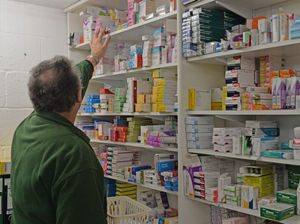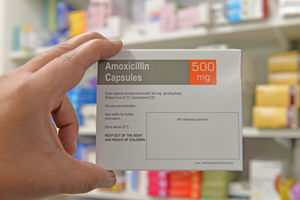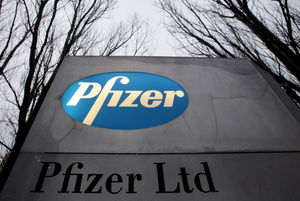West Midlands pharmacist reveals how drug price fixing is costing the NHS a fortune
Pharmacists say they are ‘trading blind’ as cost of important drugs fluctuate upwards to levels way beyond official tariffs.

Jas Matharu checks on his computer for the availability of amoxicillin. A form of penicillin to treat coughs and throat infections, it is one of the most routinely prescribed drugs that the NHS uses.
According to the NHS ‘tariff’, a packet of 28 tablets should cost £1.92. But curiously it seems to be in short supply today, with only two companies prepared to supply him. The cheapest one is charging £2.56 a packet, the other £2.99.
“I’m never going to see my patients go without their medication, so I have little choice but to take a loss,” says Mr Matharu, a pharmacist of 35 years.
It’s a similar story for aripiprazole, an anti-depressant which the NHS prices at £1.49 for 28 100mg tablets. Again, all the major suppliers are out of stock – bar one, which is seeking an asking price of £20.95 – 13 times the NHS tariff.
“Somebody has made £18 profit there,” says Mr Matharu, who runs a home-delivery prescription service from a warehouse on the outskirts of Wolverhampton.

Eventually, the NHS tariffs will be increased and backdated, and he is – usually – reimbursed his losses. But the uncertainty makes it difficult for him to plan ahead, and he has to put the money up front for the cashflow. More pertinently it is the taxpayer – and the hard-pressed NHS – that ends up footing the bill.
“I can understand that some drugs, such as the antibiotics used to treat Strep A, can be in short supply when there is a run on them,” he says.
“But this is happening for everything, for antidepressants which there is no reason for there to be a particular shortage.
“It means I am trading blind, I don’t know how much I am going to get paid. But it also means that the Government is paying out a lot of money.”
He is not the only one to be asking questions. Last month, the Competitions and Markets Authority (CMA) announced it would be carrying out an investigation into the whether the major wholesalers of prescription drugs are acting in collusion with one another in a bid to inflate the price of medicines.

In June last year the CMA imposed a £63 million on pharmaceutical giant Pfizer for abusing its dominant position to overcharge the NHS for a lifesaving epilepsy drug. Its smaller rival Flynn was also fined £7 million for a similar offence. The CMA says these activities have cost the NHS £48 million in one year alone – enough to employ 1,000 extra nurses.
The case relates to phenytoin sodium capsules, which had previously been sold under the Epanutin brand. But in an attempt to avoid price regulations that had been imposed on the drug, the companies removed the branding. Over the four years that followed, Pfizer increased prices between 780 per cent and 1,600 per cent. The company supplied the drug to Flynn, which then sold the capsules on to wholesalers and pharmacies at even higher prices – between 2,300 per cent and 2,600 per cent higher than previously charged by Pfizer.
In a single year, the cost to the NHS of supplying the capsules rose from £2 million to £50 million.
Given that Pfizer and Flynn were the dominant suppliers of the drug in the UK at the time, the NHS had little choice but to pay up.

Andrea Coscelli, then the chief executive of the CMA, said phenytoin was an essential drug relied on daily by thousands of people throughout the UK to prevent life-threatening epileptic seizures.
“These firms illegally exploited their dominant positions to charge the NHS excessive prices and make more money for themselves, meaning patients and taxpayers lost out,” he said. “Such behaviour will not be tolerated, and the companies must now face the consequences of their illegal action.”
Pfizer has lodged an appeal against the ruling, and the case is ongoing. A spokeswoman said that the case had nothing to do with collusion or price fixing.
“Pfizer disagrees with the CMA’s latest infringement decision, published in July 2022, and is appealing against it,” the company said in a statement.
“As we have consistently stated throughout this process, ensuring a sustainable supply of our products to UK patients is of paramount importance to us and was at the heart of our decision to divest phenytoin capsules to Flynn Pharma in 2012.” She said both the fine and the CMA’s decision had now been set aside following an application to the Court of Appeal.
“We maintain that we approached this divestment, as with all our business operations, with integrity and believe it fully complies with established competition law,” said the statement.
Last year, the CMA fined another four major drug suppliers – Alliance Pharmaceuticals, Focus, Medreich and Redditch-based Lexon – more than £35 million for colluding to control the supply of prochlorperazine tablets to the NHS. Prochlorperazine is an important drug used to treat nausea, dizziness and migraines. Under the arrangement, Alliance Pharmaceuticals appointed Focus as its distributor, and Lexon and Medreich were paid a share of the profits that Focus earned by selling Alliance’s product. In return, Lexon and Medreich agreed not to compete in the supply of these prochlorperazine tablets in the UK.
Before entering into this arrangement, Lexon and Medreich had been working on their own jointly-developed version of the drug, but suspended the activity on entering into a deal with Alliance and Medreich.
Over a four-year period from December 2013 to December 2017, the prices of the drug paid by the NHS rose by 700 per cent. This meant a near trebling of the NHS spending on the drug from £2.7 million in 2014 to £7.5 million in 2018, despite a fall in in the number of packs prescribed.
Advanz, Cinven, and Lexon all have form, having been fined in the past. Indeed, Advanz and Cinven made history as the first companies to be fined by the CMA as a result of three separate investigations.
In January last year, Pritesh Sonpal, a former director of Lexon, was served with a four-year ban which prevents him from operating as a company director. This came after Lexon was fined £1.2 million for colluding with King Pharmaceuticals and Alissa Healthcare Research to inflate the price of nortryptyline, a drug used to treat depression and nerve pain. Lexon was approached for comment.
Questions about the conduct of the pharmaceutical giants with relation to competition law was raised with the CMA back in 2016, when then health secretary Jeremy Hunt called for an investigation. But Mr Matharu, who has raised the matter with his MP Stuart Anderson, says the root of the problem goes back 15 years ago, when the main pharmaceutical giants began work in partnership with a smaller number of exclusive distributors.
“Many years ago, Pfizer said there was counterfeit medication in the supply chain, and as a result many manufacturers started going down the restrictive route, just supplying preferred wholesalers,” he says. Pfizer announced in March 2007 that Alliance Boots Unichem would be its sole UK distributor, claiming it was necessary to protect its most valuable drugs. Among them was the ground-breaking cholesterol-lowering drug atorvastatin, which was also becoming one of the most copied. The move was challenged in the High Court by eight rival wholesalers, but their objections were rejected, and a precedent was set. Mr Anderson says he will raise the matter with relevant ministers.





